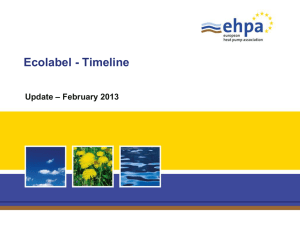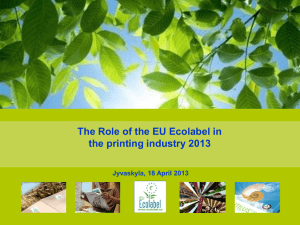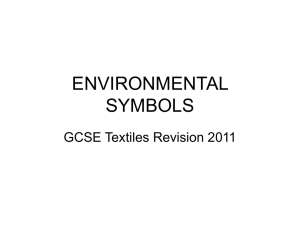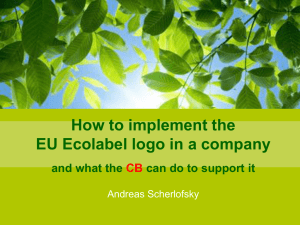Evaluatie-onderzoek EU Ecolabelverordening
advertisement
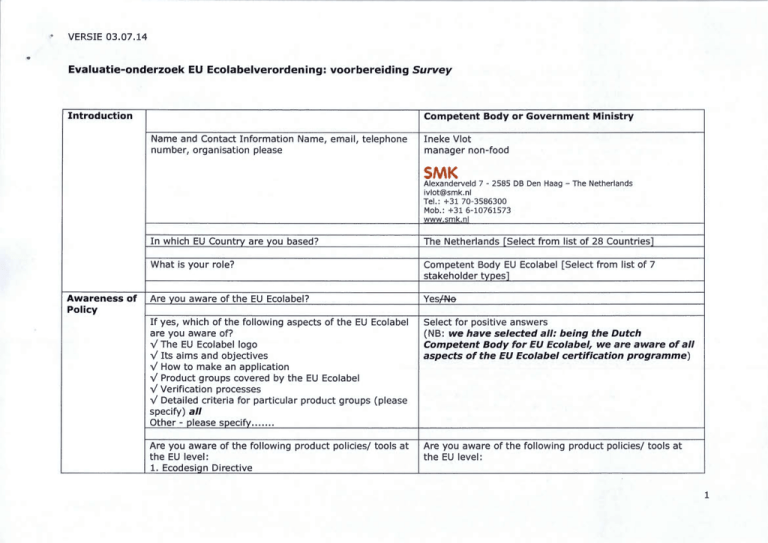
VERSIE 03.07.14 Evaluatie- onderzoek EU Ecola belverordening: voorbereiding Survey Introduetion Competent Body or Government Ministry Name and Contact Information Name, email, telephone number, organisation please Ineke Vlot manager non-food SMK Alexanderveld 7 - 2585 DB Den Haag - The Netherlands ivlot@smk.nl Tel. : +31 70-3586300 Mob. : +31 6-1 0761573 www.smk.nl Awareness of Policy In which EU Country are you based? The Netherlands [Select from list of 28 Countries] What is your rele? Competent Body EU Ecolabel [Select from list of 7 stakeholder types] Are you aware of the EU Ecolabel? Yesf-Ne If yes, which of the following aspects of the EU Ecolabel are you aware of? The EU Ecolabel logo lts aims and objectives How to make an application Product groups covered by the EU Ecolabel Verification processes Detailed criteria for particular product groups (please specify) all Other - please specify ....... Select for positive answers (NB: we ha ve selected all: being the Dutch Competent Body for EU Ecolabel, we are aware of all aspectsof the EU Ecolabel certification programme) Are you aware of the following product policies/ tools at the EU level: 1. Ecodesign Directive Are you aware of the following product policies/ tools at the EU level: v v v v v v I ! ! 1 VERSIE 03.07.14 2. 3. 4. 5. 6. Energy labelling Green Public Praeurement Product Environmental Foetprint EU Organic Label Other - please specify Are there any synergies between the EU Ecolabel and any of the following product policies/ tools: 1. Ecodesign Directive 2. Energy Labelling 3. Green Public Preeurement 4. Product Environmental Foetprint 5. EU Organic Label 6. Other - please specify YesfNe YesfNe YesfNe YesfNe YesfNe Please share more detail if you wish to. Product Environmental Footprint Organisation Environmental Footprint Energy Efficiency Directive Praeurement Regu/ation European Food Sustainable Consumption and Production Round Table EnergyStar Clean vehicles Directive SCP Action Plan Horizon 2020 Raadmap to a Resource Efficient Europe 7th Environmental Action Plan EMAS/ISO 14000 YesfNe Please specify which policy or tooi, and give detail 1.,2. Yes: as a voluntary label of environmental excellence EU Ecolabel builds forth upon Ecodesign and Energy Labelling 3. Yes: for certain product groups and services EU Ecolabelcriteria can provide a solid basis for GPP criteria, although in many cases the specific needs of public purchasers will not be met by the more consumer or B2B related EU Ecolabelcriteria, e.g. not purchasing building componentens/materials, but buildings as such 4. Currently pilots are carried out to investigate the relation of Product Environmental Foetprint and possible EU Ecolabelcriteria: in potence there is a large synergy 5. In for instanee the EU Ecolabel criteria for textile 2 VERSIE 03.07.14 products, bed matresses and Absorbent hygiene products, criteria for catton are a.o. based on certified orqanic catton Are there any conflicts between the EU Ecolabel and any of the following product policies/ tools: 1. Ecod esi gn Directive 2. Energy Labelling 3. Green Public Praeurement 4. Product Environmental Footprint 5. EU Organic Label Other, please specify Use of the EU Ecolabel YesfNe, possibly Please specify which policy or tooi, and give detail 2. EU Ecolabel criteria may sametimes require a more energy efficient performance than the best Energy Labelling class, and/or the 'product scopes' of bath instruments may nat match 3. Sametimes the specific needs of public purchasers will nat be met by the more consumer or B2B related EU Ecolabelcriteria, e.g. nat purchasing building components/materials, but buildingsas such (see above). 4. To be explored: in theory current EU Ecolabel may nat match with PEF results. Th is exploration will be part of the current pilots. 5. Same stakeholders/countries feel that future including Food/feed in EU Ecolabel, would conflict with the EU Organic Label. In The Netherlands it is feit by many stakeholders that bath Labels would complement each other, if it is clearly defined under which conditions each label would be awarded. Does your Organisation prioritise purchasing EU Ecolabelled products or services? YesfNe [Piease detail which product group and give your reasons] Dish washing detergents, toilet paper, copying paper, hand soaps. Other certified products are currently nat applicable within our office. If no, do you purchase products or services with any other label or product certification? If yes, which ones and why? Because no EU Ecolabelled food products are available, (certified) organic products or 'Milieukeur' (the Dutch national environmental label) certified food products are bought, if applicable. Also, our kitchen is Milieukeur (the national Dutch environmental label) certified and our 3 VERSIE 03.07.14 textile floor covering is C2C certified. In your opinion, are the following topics drivers, direct benefits, both or neither for manufacturers and service providers adopting the EU Ecolabel? D Imprave the competitiveness or market positioning of the product. D Respond toa specific request made by an important customer or retailer. D Aim forjachieve increased sales. D Pursuejachieve cast-saving opportunities. D Obtain access to public procurement. D To meet export market opportunities. D Increase consumers/customers interest and satisfaction. D Imprave relations/reputation with stakeholders. D Imprave employee commitment to overall company environmental performance. D Imprave management commitment to overall company environmental performance. D Better management of a specific environmental issue for the company. D Imprave overall company environmental performance. D The EU Ecolabel impraves the company organisational and managerial capabilities in the environmental area. D Better supply chain managementand capabilities D Promate product innovation D Imprave product design and development. D Access to finance/insurance. Other please specify In your view, what are the indirect benefits associated with obtaining the EU Ecolabel? Please indicate how strongly you agree or disagree with the following indirect benefits for the EU Ecolabel: D EU Ecolabel requirementsjcriteria set a benchmark [Driver/Direct benefit/A driverand a direct Benefit/Neither/ Don't know. Please share more detail if you wish to.] A driverand a direct Benefit A driverand a direct Benefit A driverand a direct Benefit Direct benefit A driverand a direct Benefit Driver Driver Driver Driver Driver Driver Neither Neither Driver Driver Neither In your view, what are the indirect benefits associated with the EU Ecolabel? [Use following scale to assess each statement: 1 - strongly disagree/2 - disagree/3 - neutrail 4 - agree/5 - strongly agree/Don't knowiPlease share more detail if you wish to.] 4 VERSIE 03.07.14 - · 4- agree for environmentally better performing products within the EU market. D EU Ecolabel requirements/criteria are useful to manufacturers to provide indicators for what a "green product" is and what its performance should be for various environmental impacts, even if a company does nat adopt the EU Ecolabel. D EU Ecolabel requirements/criteria can be used by manufacturers as a guideline and a support for the product design process towards eco-innovation, even if a company does nat adopt the EU Ecolabel. D The EU Ecolabel is a useful guide for consumers to drive their choices towards the greenest products on the market. D The EU Ecolabel criteria are a useful guide for companies who intend to develop green praeurement strategies e.g. selecting suppliers on the basis of environmental criteria. D The EU Ecolabel drives improvements in environmental performance of non-EU Ecolabelled products and services. D When a company adopts the EU Ecolabel the level of awareness of environmental issues increases amongst the employees. D Job opportunities are created because companies using the EU Ecolabel hire new personnel with expertise and specific know how. D The EU Ecolabel criteria support companies in making correct and effective environmental claims, helping to avoid "green-wash". D EU Ecolabel raises awareness of citizens that the EU sees environmental issues as a priority. Other please specify. 4 - agree, but to imprave and support this effect, communications aimed at the public and public awareness campaigns etc. need to be increased In order to pu rsue the benefits associated with the EU Ecolabel, what actions do companies undertake or carry out? Please indicate how strongly you agree/disagree In order to pursue the benefits associated with the EU Ecolabel, what actions do companies undertake or carry out. [Use following scale to assess each statement: 1 - 4- agree 4- agree 5 - strongly agree 4- agree 4- agree 4- agree 2- disagree 5 - strongly agree 5 VERSIE 03.07.14 that companies carry out the following actions for promoting their EU Ecolabelled products: D Advertising on TV, rad io, press or other media (including street advertising). D Advertising on new media (such as the web). D Communication on the company website. D Marketing "in-field" when participating in fairs, expositions, etc. D Direct communication to key-clients (e.g.: engagement in a workshop or other direct contacts). D Communication within the supply chain (e.g. to suppliers). D External communication towards the stakeholders (e.g. press release, company newsletter, involvement of local authorities, communication with NGOs, etc.). D Training and invalving the sales personnel of the company to promate the EU Ecolabel with the (potential) clients. D Partnership with NGOs to promate the EU Ecolabel andlor the EU Ecolabelled products. D Commercial agreement or partnership with retailers to promate the EU Ecolabelled products on the shelf or in the point of sale. D Discounts or other special price-policies applied to the EU Ecolabelled products. D Increased budget for marketing the EU Ecolabelled products. Other please specify What are the main barriers and difficulties that firms experience with the EU Ecolabel? Please indicate how strongly you agreeldisagree with the following barriers for the EU Ecolabel: strongly disagreel2 - disagreel3 - neutrail 4 - agreel5 - strongly agreeiDon 't knowiPlease share more deta il if you wish to.] 4 - agree, but TV and radio advertising is very rare, being very costly 4- agree 5 - strongly agree 5 - strongly agree 4- agree 4- agree 4- agree 4 - agree 1 - strongly disagree 2- disagree 2- disagree 2- disagree What are the main barriers and difficulties that firms experience with the EU Ecolabel? [Use following scale to assess each statement: 1 - strongly disagreel2 disagreel3 - neutrail 4 - agreel5 - strongly agreeiDon't knowiPlease share more detail if you w ish to.] D Casts of adopting the EU Ecolabel (including casts of 6 VERSIE 03.07.14 complying with the relevant criteria). D In particular, the casts of the EU Ecolabel licence. D Too much documentation required/ too much "red tape". D Complexity of documentation. D Requirements are too stringent. D Lack of human resources and competence within the company. D Lack of technica! and information support from outside the company. D Lack of external incentives (including fiscal incentives or access to public procurement). D Lack of competitive rewards and advantages. D Lack of recogniti on by the stakeholders. D Lack of recogniti on by the public institutions (including reg ul atory relief). D Lack of recognition at the international level. D Too difficult to communicate the EU Ecolabel to stakeholders and consumers (incl. use of the logo). D Too many individual requirements (criteria) D Requirements (criteria) are not addressing the most relevant environmental impacts Other, please specify EU Ecolabel and other nation al labe!!_ 4- agree (especially the casts of (lab) testing required). 2 - disagree - However: the fees between countries differ and there are rules according to the Regulation where to apply. One Dutch industry organisation has complained about a 'non-level playing field', pleading toadopt (again) a uniform fee level in all EU Member States in the future (e.g. after revision of the Regulation). 4- agree 4- agree 4- agree 4- agree 4- agree 5 - strongly agree 5 - strongly agree 4- agree 4- agree 2242- disagree disagree agree disagree One Dutch industry organisation has complained about a lack in harmonization between CBs in the assessment of dossiers and the issuing of licenses, thus creating a 'nonlevel playing field' Sa) Does your country have an ecolabel that covers any of the same product groups as the EU Ecolabel? YesfNe Sb) If yes to Sa , please name the label (multiple labels Milieukeur - 7 VERSIE 03.07.14 are welcomed) If yes to Sa, Do you agree/disagree with the following statements? Please tick applicable boxes: When compared to the label highlighted in Sb, the EU Ecolabel. .. 0 The EU Ecolabel is better known by stakeholders/customers. 0 The EU Ecolabel has stricter environmental performance requirements. 0 The EU Ecolabel has easier application procedures. 0 The EU Ecolabel requires the sametype of application information (from suppliers, test certifications, etc) 0 The EU Ecolabel has lower costs than the other label(s). 0 The EU Ecolabel has better application support (e.g. advice from the Competent Body, guidance documents and templates) than the other label. 0 The EU Ecolabel is more distinctive than the other label(s) (because it is more credible or has a better reputation). 0 The EU Ecolabel is more widespread among our main competitors or among the other members of our trade association. 0 The EU Ecolabel is more valuable than the other label(s) (it implies better economie and I or competitive performances) 0 The EU Ecolabel has a more robust methodological approach (e.g. LCA, hazardous substances restrictions) for the same product groups. [Use following scale to assess each statement: 1 - strongly disagree/2 - disagree/3 - neutrail 4 - agree/5 - strongly agree/Don't knowiPlease share more detail if you wish to.] 4- agree n.a.: Milieukeur concerns other product groups, for which EU Ecolabel is not available n.a.: Milieukeur concerns other product groups, for which EU Ecolabel is not available 2 - disagree: Milieukeur is an accredited label, meaning that the inspeetion/audits and test reports required etc. are subject to more stringent verification requirements, although there are some similarities 4 - agree, but this will change in the coming years, as the EU Ecolabel fee structure has been adapted in The Netherlands 2 - disagree. Because of the independency of Milieukeur as accredited label, licensed independent Certification Bodies carry out the inspections and they are responsible for the award of certificates 1 - strongly disagree, because of the independency of Milieukeur as accredited label (see above) The question is unclear: what do you mean by 'our' and 'our trade association'? Also, Milieukeur concerns other product groups, for which EU Ecolabel is not available. If looked at the topic in more general way: 4 - agree 2 - disagree. The community of Amsterdam grants 'regulatory relief' in case of Milieukeur certified products or services in particular cases. 4- agree regarding some respects, e.g. with regard to hazardous substances restrictions 8 VERSIE 03.07.14 D The EU Ecolabel has different objectives, goals and target groups to the other label(s) If yes to Sa, Are there are other synergies between the EU Ecolabel and the label(s) you highlighted? As Milieukeur concerns other product groups and services, like for instanee 'green' electricity and data centre elimate control, Milieukeur could serve as a pilotand 'pave the way' for new, interesting EU Ecolabel product groups. Also, Milieukeur agro/food serves since many years a clear and growing market in addition to certified organic food products: this may help to broaden the EU Ecolabel to food/feed in the future. lf yes to Sa, Are there other conflicts between the EU In principle, normally no Milieukeur criteria are developed, if EU Ecolabel criteria are available. However, the current EU Ecolabel criteria approach concerning sustainable wood (FSC, PEFC or equivalent) conflicts with the findings of SMK's Timber Praeurement assessment committee, see: http://www.tpac.smk.nl/32/home.html. This is a more general conflicting policy matter, nat specifically related to Milieu keur. If yes to Sb, How would you solve the problem of the existing conflicts you identified between the EU Ecolabel and the other label(s)? EU Ecolabel Yes, certainly: in some Milieukeur certification schemes, criteria are included that refer to EU Ecolabel criteriajEU Ecolabel certification (verification), for instanee in Hospitals and care institutions. and Events lf yes to Sa, How would you strengthen the synergies you identified between the EU Ecolabel and the label(s)? Ecolabel and the other label(s)? Impact of the 1 - strongly disagree: Milieukeurand EU Ecolabel bath aim at promoting sustainable consumption and production and do nat compete, but complete each other EU Ecolabel would have to follow a different approach towards sustainable certified wood, in order to align with the Dutch Timber Praeurement Poli How has the EU Ecolabel performed over time? For example 9 VERSIE 03.07.14 - Increased overall number of EU Ecolabelled products on the market. - The EU Ecolabel produced an increase of sales of greener products in general. Do you have data that demonstrates these points? May we have access to this data? - Inclusion of the EU Ecolabel criteria in Public Procurement. Model I Costs of the EU Ecolabel Does the current business model of the EU Ecolabel work well? Please indicate how strongly you agree/disagree with the following sentences D The time-span to obtain the EU Ecolabel should be shortened D The number of criteria should be limited, covering the main environmental impacts D The time-span for the criteria development/revision process should be shortened D The criteria development/revision process should be simplified whenever reliable science-based information on the environmental impact categories is already available D The transition period for existing licence holders to comply with the new criteria is adequate D The scheme should cover a higher percentage of the market's products D The procedures of the Competent Bodies of different Member States need to be harmonized D The fee structure is adequate [Use following scale to assess each statement: 1 - strongly disagree/2 - disagree/3 - neutral/4 - agree/5 - strongly agree/Don't knowiPlease share more detail if you wish to.] 2- disagree 2- disagree 4- agree (within the Commission, sametimes the revision procedure takes a long time, e.g. for rinse-off cosmetics) 4 - agree (but our experience is that stakeholders may disagree about reliable science-based information, thus discussion is still to be expected) 4- agree 4 - agree (this would increase the impact of the EU Ecolabel en make it more well-known, however the EU Ecolabel needs to be 'top of the market' and therefore needs to be selective) 4- agree 2 - disagree: the current flexibility may cause confusion and may cause companies to look for the 'cheapest way out' 10 VERSIE 03.07.14 D The prevision of reduced fees should be extended to ether categories of beneficiaries D The scope of the scheme should be extended to include more intermediate product groups D The scope of the scheme should be extended to include food, feed and beverages product groups D The marketing and promotional activities for the EU Ecolabel at the European level are adequate to stimulate the market for products with the Ecolabel D The marketing and promotional activities for the EU Ecolabel at the national level are adequate to stimulate the market for products with the Ecolabel D The promotion of the EU Ecolabel should be strengthened within GPP promotional initiatives D Member States should provide more fiscal incentives to licence holders D The European Commission should increase the level of integration of the EU Ecolabel in the existing EU legislation Other please specify 2 - disagree (will make the situation more confusing) 2 - disagree: this will make EU Ecolabel still more complex 4 - agree, see above: Milieukeur agro/food serves since many years a clear and growing market in addition to certified organic food products: this may help to broaden the EU Ecolabel to food/feed in the future. 2- disagree: more (and ether kind of) of such activities will increase the impact of the EU Ecolabel (but we realize that EC financial resources are scarce) 2 - disagree: more (and ether kind of) of such activities will increase the impact of the EU Ecolabel, but national budget is scarce due to ether priorities 4 - agree, as far as the public purchasers buy EU Ecolabel related products and services within the boundaries of the Praeurement Reguiatien 4 - agree in principle, but this seems 'utopie' due to legal limitations etc. 2 - disagree: the EU Ecolabel is a voluntary instrument and should stay so Would you recommend stopping the application of the EU Ecolabel in any of the product groups that are currently covered by the Scheme? Please indicate which and give reasons. No, but we would advise not to (further) develop EU Ecolabel criteria for any kind of buildings and building materials in the future, as ether building related instruments will be more effective to increase the sustainability of buildings Would you recommend including new product categories in the EU Ecolabel scheme? Please indicate which products and give reasons. Energy efficient data centres, 'green' electricity and fire extinguishers are interesting product groups, but currently no stakeholder initiatives are available to take up the EU Ecolabel criteria development process, as this will be very time and cast demanding I 11 VERSIE 03.07.14 Have you ever tried to quantify the whole eest of applying for the EU Ecolabel? If yes, can you provide figures for the first licence application and for the annual "maintenance" of the licence? no How could these costs be reduced? No suggestions: both the first application and the license 'maintenance' are time consuming with the current procedures etc. Under accreditation, these procedures would even be more demanding (and more costly). What is the total annual eest associated with the activities carried out by the CB? Please report the last available official figure or provide an estimate € 305 .000 (2014) What is the relative weight of the following eest items: D attendances feesof the members; D travel & subsistenee costs of the members; D marketing activities; D assessment and verification costs (e.g.: hiring experts for specific product groups, etc.); D market surveillance and control of the use of the EU Ecolabel; D fixed costs (e.g.: structural costs telephone, etc ...) . 5% 4% 80% 1% 10% Are the designated members of the CB full time employees or external experts? 2 internal employees, in total 1.5 FTE (Apart from the members of the Competent Body) How many FTEs werk on the scheme? 0.22 FTE external experts Has the CB a dedicated budget for promotion/training/external assistance activities? Which is the annual amount? How has this budget evolved over time? Has it been affected by the current economie downturn? n.a. 12 VERSIE 03.07.14 • Is the Competent Body Forum effective in promoting the exchange of experiences and ensuring a consistent implementation of the scheme in different Countries? Yes, certainly Does the criteria development/revision process ensure a balanced participation of all relevant interested parties concerned with a particular product group? Yes, certainly Are the means invested appropriate in quantity and quality to achieve the defined objectives of the EU Ecolabel? - Means invested by the national government via the Competent Body? - Means invested by the European Commission? Are the means invested in the EU Ecolabel - considering its relevanee and (potential) effectiveness - appropriate compared to the means invested in ether policy tools (considering their impact, effectiveness, future potential)? - from the national government via the Competent Body? - from the European Commission? What could be done to improve the implementation of the EU Ecolabel? The Dutch CB is limited in its capacity. Participating in EU Ecolabel criteria development/revision is possible only to a very limited extent, and only fora few priority product groups. Our main activities concern assessment and verification. Due to limited capacity and related expertise, external experts are consulted regarding some application dossiers. Increase in invested means would help to improve the EU Ecolabel and bring forward the discussion on certain important issues, for instanee by creating a Horizontal Task Force on Fibres (sustainable wood). The invested means are relatively low compared toether policy tools, both on the European and the national level. For the future, a possible increase in impact could be realized by linking EU Ecolabel (criteria) toether innovative instruments to promote sustainable production and consumption, like the C02 Performance Ladder in The Netherlands (see: httQ:LLwww .skao. niLindex. QhQ?ID=45 ) Also, the link of EU Ecolabel criteria to the Dutch Public Preeurement criteria for cleaning, has increased the amount of EU Ecolabel certificates and applications siqnificantly. This example can be foliowed in ether 13 VERSIE 03.07.14 relevant product groups. Future of the EU Ecolabel Is the EU Ecolabel, and its set of common requirements, a valuable tooi to facilitate a higher uptake and free circulation of green products (in the pursuit of a single market for green products) across Europe? YesfNe [Piease share more detail], especially when linked to other product policy instruments like green public praeurement criteria and innovative instruments like the C02 Performance Ladder (see above). Extensive stakeholder consultation and dialogue provides a solid basis for public support of the EU Ecolabel instrument: this is a unique strong key characteristic of the EU Ecolabel. Is it beneficia! to have a set of common requirements in the pursuit fora single market for green products across Europe in the form of the EU Ecolabel? YesfNe [Piease share more detail]. Noother camparabie transparent, reliable environmental certification instrument for both consumers and B2B information purposes is available on the European market. Overall, would you recommend retaining the EU Ecolabel as it is changing it or abolishing the scheme? [Retain as is lf selected Changing If you recommend changing the scheme, what would you suggest to imprave the EU Ecolabel? Please indicate how strongly you agreeldisagree with the following suggestions: D The EU Ecolabel requirements should be fewer in number and focus on the most significant impact areas. D The processof developing the EU Ecolabel requirements should be streamlined and made faster. D The awarding process should move from "passlfail" system to a "point" system, where products need to gain a certain minimum number of points to be awarded the label, but the decision about priority areas for impravement is left to applicants. [Use following scale to assess each statement: 1 - strongly disagreel2 - disagreel3 - neutrail 4 - agreeiS - strongly agreeiDon't knowiPlease share more detail if you wish to.] 2- disagree D The requirements should be based on life-cycle I Change I Abolish] 4 - agree (Internal Service Consultation within the European Commission aften take a lot of time) 2 - disagree: but this needs to investigated thoroughly befare introduetion and a "point" system only is undesirable, maybe a 'case by case' approach is feasible (NB: negative propertiescan be compensated: do we accept this?). In for instanee the Dutch Milieukeur system such flexibility is included for certain product groupslservices, defining both obligatory and optional criteria 4- aqree 14 • VERSIE 03.07.14 • indicators. D EU Ecolabelled products should be subsidised or incentivised to imprave their competitiveness. D The EU Ecolabel should be more integrated and consistent with national labels. D The EU Ecolabel can be strengthened by introducing the requirement of providing indicators on the key environmental impacts of the product, to be included in (or accompanied to) the label. D The scope of the EU Ecolabel should be widened from environmental to sustainability issues (e.g.: to include social, ethica! and safety aspects). D The EU Ecolabel should be transformed into a "graded label" covering all products and showing their relative environmental performance, instead of the current label rewarding top-class products. D The EU Ecolabel should be more intensively promoted by the institutions (at the EU, national and local level). Other. Please specify .. ........ ................... ................. Subsidized: 2 - disagree; Incentivized: 4 - agree. The market must provide for itself. 4 - agree: however, we feel that attention is already paid to such integration. See also below about the general apinion of our Ministry of Environment concerning environmental labels, expressed in: From resource efficiency to a circular economy - Contribution trom the NL Ministry of Environment to the forthcoming Communication on the Circular Economy, 14-02-2014 2- disagree Sustainability (socialjethical): 4 - agree; safety: 2 disagree - this must be covered by reg u lation (law)! 2 - disagree (too ambitious, not realistic, will not be supported by industries) 4 - agree, wherever possible, for instanee when a relevant for Green Public Praeurement If selected abolish If you recommend abolishing the EU Ecolabel is there an alternative scheme (existing or to be developed) that could be applied in the EU to replace the current EU Ecolabel scheme? n.a. If selected abolish Why would this be more attractive and efficient? n.a. Please share with us any further comments you would like to make. Our Ministry of Environment has expressed recently the following apinion: 15 VERSIE 03.07.14 Environmental/abels The Commission could look into ways for harmonizing the world of labels in Europe and - by taking into account behaviaral science - making them more effective as a tooi to influence consumer behavior. For example by making comparison between products possible and identifying options for making the level of sustainability of products visible or readable in a simple manner on a label with figures, or for example by a barcode readable by smart phones and connected to social media. The Commission should develop ways to prevent the use of misleading and unreliable green claims on labels. Source: From resource efficiency to a circular economy Contribution from the NL Ministry of Environment to the forthcoming Communication on the Circular Economy, 14-02-2014 16 •
